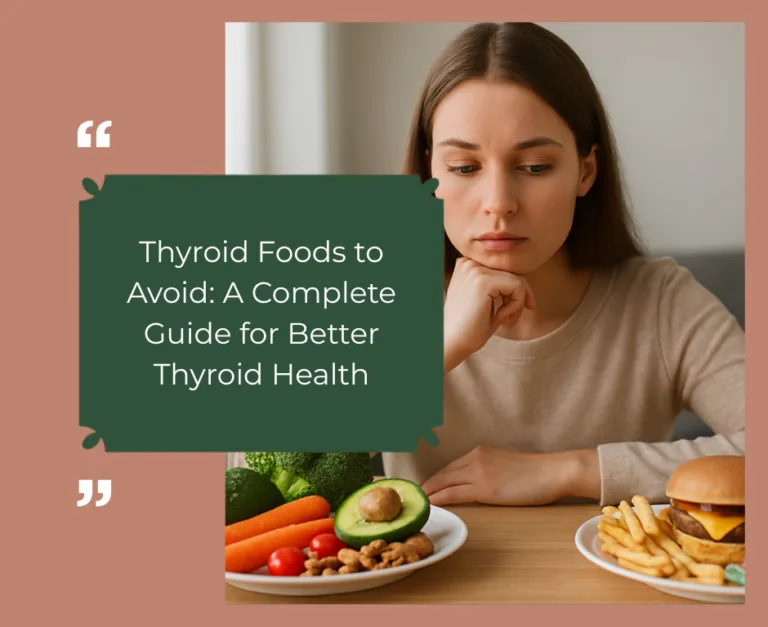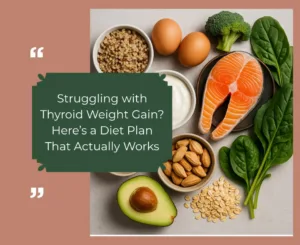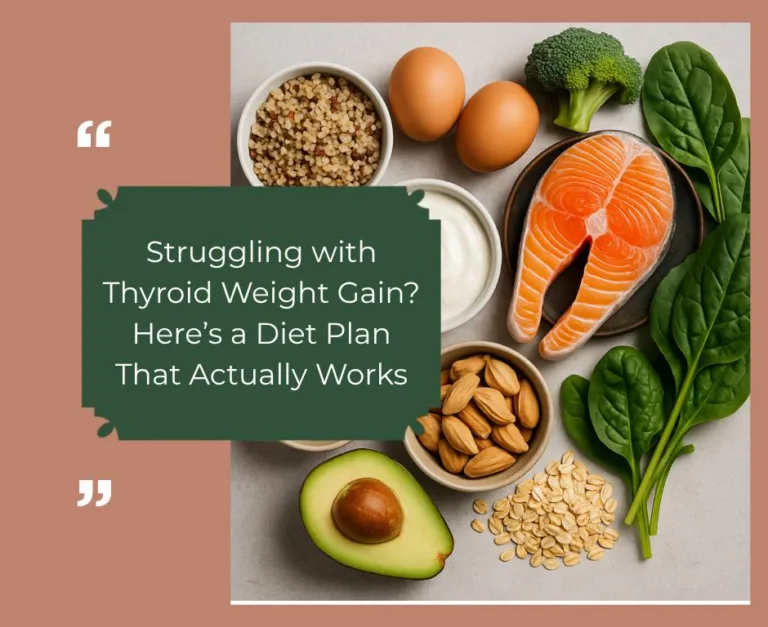Introduction
If you’ve been diagnosed with a thyroid condition or are at risk of developing one, you’ve probably wondered: “Does my diet really affect my thyroid?” The answer is yes. The thyroid gland, though small, controls metabolism, energy, and hormone regulation. Certain foods can interfere with thyroid hormone production, worsen symptoms, or block medication absorption.
In this blog, we’ll explore the top thyroid foods to avoid, clear up common myths, and share practical tips reviewed by Dietician Richa so you can make smarter food choices.
Understanding Thyroid & Its Role in Your Health
Your thyroid is a butterfly-shaped gland in your neck that produces hormones (T3 and T4) controlling energy, body temperature, and metabolism.
- Hypothyroidism (underactive thyroid): Low hormone production → fatigue, weight gain, hair loss.
- Hyperthyroidism (overactive thyroid): High hormone production → anxiety, weight loss, rapid heartbeat.
While medication is usually the main treatment, your diet can either support or sabotage thyroid health.
Why Avoiding Certain Foods Matters in Thyroid Disorders
Food affects thyroid function in three main ways:
- Interferes with hormone production (e.g., goitrogenic foods).
- Blocks absorption of thyroid medication (e.g., high-fiber foods, soy, coffee).
- Triggers inflammation or autoimmunity (e.g., gluten in Hashimoto’s disease).
That’s why knowing the foods to avoid in thyroid problems is critical.
Foods to Avoid in Thyroid Conditions
Cruciferous Vegetables (in excess)
Broccoli, cauliflower, cabbage, kale, and Brussels sprouts contain goitrogens, compounds that may interfere with iodine uptake, especially if eaten raw and in large amounts.
👉 Tip: Cooking reduces most goitrogens. Moderate intake is safe, unless advised otherwise by your doctor.
Soy & Soy-based Foods
Soy contains isoflavones that may interfere with thyroid hormone absorption, especially in hypothyroidism.
- Foods to limit: Soy milk, tofu, soybeans, soy protein powders.
- If you’re on thyroid medication, keep at least a 4-hour gap between soy and your medicine.
Processed Foods & Sugary Snacks
Packaged snacks, fast food, and sugary desserts can:
- Slow down metabolism.
- Contribute to weight gain (already a concern in hypothyroidism).
- Trigger inflammation.
Gluten & Refined Grains
Gluten may worsen autoimmune thyroid conditions like Hashimoto’s. Some studies show gluten can mimic thyroid tissue, confusing the immune system.
- Foods to avoid: White bread, pasta, pastries, biscuits.
- Better option: Whole grains (unless you have celiac/autoimmune condition).
High-fat & Fried Foods
Excess unhealthy fats can:
- Inhibit thyroid hormone absorption.
- Increase cholesterol levels (already elevated in hypothyroidism).
Examples: Deep-fried snacks, processed meats, creamy sauces.
Excess Caffeine & Alcohol
Coffee, energy drinks, and alcohol may:
- Interfere with thyroid medication absorption.
- Stress your liver, which metabolizes thyroid hormones.
Certain Fruits & Seeds
- Millets: Can reduce iodine uptake.
- Strawberries & peaches: Contain small amounts of goitrogens (safe in moderation).
- Flaxseeds: Excess may alter thyroid hormone levels.
Summary Table: Foods to Avoid in Thyroid
| Food Group | Examples | Why Avoid? | Safer Alternatives |
|---|---|---|---|
| Cruciferous Vegetables | Raw cabbage, kale, broccoli | May interfere with iodine uptake | Cooked, moderate amounts |
| Soy Products | Soy milk, tofu, soybeans | Block medication absorption | Other plant proteins |
| Processed Foods | Chips, cakes, fast food | Inflammation, weight gain | Fresh home-cooked meals |
| Gluten | Bread, pasta, biscuits | Autoimmune trigger | Gluten-free grains |
| Fried & Fatty Foods | Deep-fried snacks | Block hormone absorption | Grilled, steamed foods |
| Caffeine & Alcohol | Coffee, liquor | Interfere with medication | Herbal teas, water |
Myths vs. Facts About Thyroid Diet
- Myth 1: “You should never eat cruciferous vegetables.”
✅ Fact: Cooking reduces goitrogens, and moderate intake is safe. - Myth 2: “All thyroid patients must go gluten-free.”
✅ Fact: Only those with autoimmune thyroiditis or gluten intolerance need strict avoidance. - Myth 3: “Soy is always harmful.”
✅ Fact: Timing matters. Consuming soy several hours after medication is usually safe.
Expert Insights: A Dietician’s Perspective
As a dietician, I emphasize balance over restriction. Avoiding certain foods doesn’t mean you should eliminate entire food groups. Instead:
- Eat iodine-rich foods (iodized salt, seaweed – in moderation).
- Include selenium and zinc (nuts, eggs, legumes).
- Stay consistent with medication timing.
Tips to Manage Thyroid Through Diet
- Eat a nutrient-rich, anti-inflammatory diet.
- Avoid skipping meals.
- Keep a 2–4 hour gap between medication and high-fiber or soy foods.
- Stay hydrated.
- Combine diet with regular physical activity.
Your thyroid health depends not just on what you eat, but also how consistently and mindfully you eat. By avoiding certain foods and including thyroid-friendly nutrients, you can support better hormone balance.
👉 If you’re struggling with thyroid symptoms, consider booking a personalized diet consultation with a qualified dietician to create a meal plan tailored to your needs.
FAQs on Thyroid Foods to Avoid
Q1: Can I eat cruciferous vegetables like broccoli or cabbage if I have thyroid problems?
Yes, but in moderation. Cruciferous vegetables may interfere with iodine absorption when eaten raw in large amounts. Cooking reduces this effect, making them safe to include occasionally in a balanced diet.
Q2: How does soy affect thyroid health and should it be avoided completely?
Soy can interfere with thyroid hormone absorption, especially in hypothyroidism. You don’t need to avoid it completely but maintain a 3–4 hour gap between soy foods and thyroid medication.
Q3: Should thyroid patients follow a gluten-free diet?
Not all thyroid patients need to go gluten-free. It’s mainly helpful for those with Hashimoto’s thyroiditis or celiac disease. Others can consume whole grains unless advised otherwise.
Q4: Does coffee affect thyroid medication?
Yes. Coffee can reduce the absorption of thyroid medication. It’s best to wait at least 60 minutes after taking your medicine before drinking coffee.
Q5: What snacks are safe for thyroid patients?
Fresh fruits, roasted seeds, yogurt, and nuts are great snack options. They provide essential nutrients without interfering with thyroid function or medication.

























